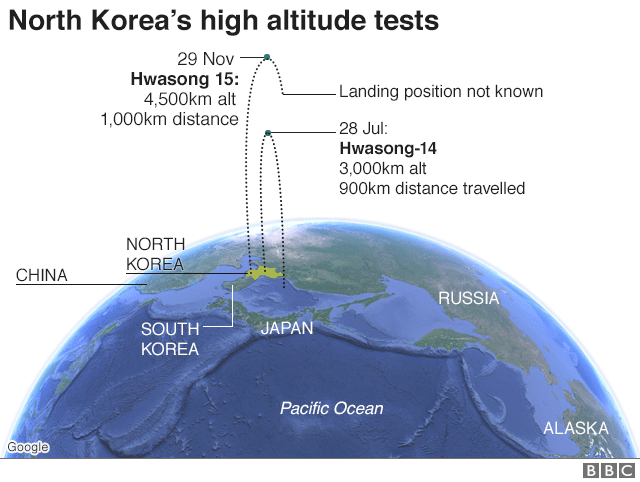China and Russia, North Korea's main trading partners, voted in favour of the resolution.
The country is already subject to a raft of sanctions from the US, the UN and the EU.
- North Korea crisis in 300 words
- Can the world live with a nuclear North Korea?
- Sanctions won't stop us, warns N Korea
The US ambassador to the UN, Nikki Haley, said the sanctions sent an "unambiguous message to Pyongyang that further defiance will invite further punishments and isolation".
Chinese envoy Wu Haitao said the vote "reflects the unanimous position of the international community" on the issue of North Korea's weapons programme.
US President Donald Trump also welcomed the resolution. He tweeted the world wanted "peace, not death".
What are the new sanctions?
Tensions have risen this year over North Korea's nuclear and missile programmes, which it has pursued despite pressure from world powers to stop.The Trump administration says it is seeking a diplomatic solution to the issue, and drafted this new set of sanctions:
- Deliveries of petrol products will be capped at 500,000 barrels a year, and crude oil at 4 million barrels a year
- All North Korean nationals working abroad will have to return home within 24 months under the proposals, restricting a vital source of foreign currency
- There will also be a ban on exports of North Korean goods, such as machinery and electrical equipment
Sanctions target a North Korean lifeline
Analysis by Nada Tawfik, BBC News, New YorkThis is the 10th Security Council resolution imposing sanctions on North Korea.
None yet has convinced Kim Jong-un to abandon his nuclear programme, but diplomats hope this resolution will bite hard enough to change the country's path, or at the very least, restrict its ability to carry out additional nuclear and missile tests.
These strong new sanctions, passed with China's support, show the growing concern of the international community to the threat posed by Kim Jong-un.
President Trump specifically asked President Xi to cut oil to North Korea, believing it would be a pivotal step.
According to the US, North Korea imported 4.5 million barrels of refined petroleum in 2016. This resolution now caps North Korea's supply to 500,000 barrels a year - a nearly 90% cut to a vital lifeline for Pyongyang.
What sanctions are already in place?
Last month, the US unveiled fresh sanctions against North Korea which it said were designed to limit the funding for its nuclear and ballistic missile programmes.The UN also approved new sanctions following North Korea's nuclear test on 3 September.
These measures restricted oil imports and banned textile exports - an attempt to starve the North of fuel and income for its weapons programmes.
Have previous sanctions worked?
The US has been imposing sanctions on North Korea for more than a decade with little success.In fact, North Korea has said fresh sanctions will only make it accelerate its nuclear programme. It has continued to test nuclear and ballistic missiles despite these recent examples of UN pressure:
- 30 November 2016: UN targeted North Korea's valuable coal trade with China, slashing exports by about 60% under a new sales cap. Exports of copper, nickel, silver, zinc and the sale of statues were also banned
- What happened next? On 14 May 2017, North Korea tested what it said was a "newly developed ballistic rocket" capable of carrying a large nuclear warhead
- 2 June 2017: UN imposed a travel ban and asset freeze on four entities and 14 officials, including the head of North Korea's overseas spying operations
- What happened next? On 4 July, North Korea claimed it carried out its first successful test of an intercontinental ballistic missile (ICBM)
- 6 August 2017: UN banned North Korean exports of coal, ore and other raw materials and limited investments in the country, costing Pyongyang an estimated $1bn - about a third of its export economy
- What happened next? On 3 September, North Korea said it tested a hydrogen bomb that could be miniaturised and loaded on a long-range missile















No comments:
Post a Comment